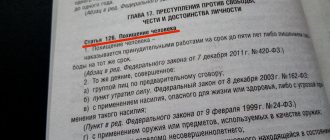Chapter 19 of the Criminal Code of the Russian Federation lists crimes against the constitutional rights and freedoms of man and citizen. Many of them are quite rare in practice, especially those related to violations of election legislation, but there are also common ones, such as Art. 143 of the Criminal Code of the Russian Federation, art. Art. 145 and 145.1 of the Criminal Code of the Russian Federation concerning the sphere of labor relations, there are also such as Art. 138.1 of the Criminal Code of the Russian Federation, which limits the circulation of special equipment, the practice of which is just emerging, and so far in a sad way.
Article 136. Violation of equality of rights and freedoms of man and citizen
Article 137. Violation of privacy
Article 138. Violation of the confidentiality of correspondence, telephone conversations, postal, telegraph or other messages
Article 138.1. Illegal trafficking of special technical means intended for secretly obtaining information
Article 139. Violation of the inviolability of the home
Article 140. Refusal to provide information to a citizen
Article 141. Obstruction of the exercise of electoral rights or the work of election commissions
Article 141.1. Violation of the procedure for financing the election campaign of a candidate, electoral association, activities of the initiative group for holding a referendum, or another group of referendum participants
Article 142. Falsification of election documents, referendum documents
Article 142.1. Falsification of voting results
Article 142.2. Illegal issuance and receipt of a ballot paper, a ballot paper for voting in a referendum
Article 143. Violation of labor protection requirements
Article 144. Obstruction of the legitimate professional activities of journalists
Article 145. Unreasonable refusal to hire or unjustified dismissal of a pregnant woman or a woman with children under three years of age
Article 145.1. Non-payment of wages, pensions, scholarships, benefits and other payments
Article 146. Infringement of copyright and related rights
Article 147. Infringement of inventive and patent rights
Article 148. Violation of the right to freedom of conscience and religion
Article 149. Obstruction of holding a meeting, meeting, demonstration, procession, picketing or participation in them
This list of articles defines the elements of unconstitutional crimes and further consolidates the constitutional guarantees of citizens, protects the rights and freedoms of man and citizen.
CRIMINAL LAWYER call now: ☎ 8 (495) 532-75-40
However, the Russian law enforcement system is built in such a way that the expression that “the road to hell is paved with good intentions” can be fully applied to its functioning. The good goals, rights and freedoms of citizens of the Russian Federation are overshadowed by the race for the next performance indicators of the investigative authorities. Take the infamous example of a farmer who ordered a GPS tracker for a cow from a well-known Chinese website so that it would not get lost or wander outside the pasture. The investigators wanted to prosecute an honest entrepreneur who produces milk and beef for all of us under Art. 138.1 of the Criminal Code of the Russian Federation for illegal trafficking of special technical means intended for secretly obtaining information, considering that the GPS tracker is a spyware. There was even an expert who “drew” a conclusion, concluding that the tracker is used to secretly obtain information. The situation was saved only by public outrage; fortunately, the farmer was released from criminal liability. And there are thousands of such examples.
Lawyer for crimes against constitutional rights and freedoms of man and citizen
A lawyer in criminal cases, including crimes against the constitutional rights and freedoms of man and citizen, always begins his work by getting to know the client and clarifying all the circumstances of the incriminated act. This is followed by familiarization with the available case materials, their analysis, and only then, together with the client, the most correct position of the defense is approved. No one is immune from criminal prosecution, as a rule, trouble comes unexpectedly, and if you or one of your relatives have been criminally prosecuted for one of the crimes provided for in Chapter 19 of the Criminal Code of the Russian Federation, the first thing you should do is find a lawyer who you can entrust your protection. To contact a lawyer, you can call the phone number listed on our website.
A citizen has the right to defend his life by all means
Chairman of the Board of the Russian Bar Association Vladimir Gruzdev said that, according to the Judicial Department of the Supreme Court of Russia, in the six months of this year, 132 people were convicted under Article 108 of the Criminal Code “Murder by exceeding the limits of necessary self-defense.” Two people were acquitted. 203 people were convicted of causing grievous bodily harm by exceeding the limits of necessary self-defense. There were no acquittals under this article for six months.
“In addition, the question of whether a person’s actions were motivated by necessary self-defense often arises in cases involving charges of murder or violence causing grievous bodily harm. The topic of self-defense and its permissible limits is acute and resonant. It is extremely important to maintain a reasonable line, not allowing distortions in either direction, since often people who commit violence try to slander their victims and pass off their actions as self-defense in order to evade responsibility. On the other hand, law enforcement agencies sometimes bring unfair charges against people who defended their lives and the lives of their loved ones,” noted Vladimir Gruzdev.
A few years ago, the plenum of the Supreme Court of Russia adopted a special resolution clarifying the rules of self-defense. The main rule: you can protect your life by all means. The right to defense is given not only by an attack, but even by the threat of life-threatening violence.
“Responsibility for exceeding the limits of necessary defense occurs only if it is established in the case that the defender was aware that he was causing harm that was not necessary to prevent or suppress a specific socially dangerous attack. The legal positions of the Supreme Court of Russia are deeply developed and substantiated. It is important that they are accepted in practice by all law enforcement officials,” emphasized Vladimir Gruzdev.
What are the correct actions in the event of a delay in payment of wages?
If the payment of wages is delayed for a period of more than 15 calendar days, the employee (if the situation that has arisen is not named among those that do not allow such a state of affairs) has the right to suspend work (Article 142 of the Labor Code of the Russian Federation). The following actions would be correct:
- the employer must be notified in advance in writing of the suspension of activities;
- you may be absent from the workplace during the period of suspension;
- You must go to work the next working day after receiving a written message from your employer indicating your readiness to pay the delayed salary.
The employer is obliged to pay for the suspension time based on average earnings (Article 142 of the Labor Code of the Russian Federation).
Absenteeism from work without written warning or upon a resignation letter submitted without observing the 2-week work period is not recommended (Article 80 of the Labor Code of the Russian Federation). These situations may lead to the employer recording absenteeism and gaining the right to dismiss the employee due to violation of labor discipline.
If an employee decides to quit due to non-payment of wages, then it is better to formalize the suspension of work and simultaneously submit a resignation letter in the usual manner.
You can find more complete information on the topic in ConsultantPlus. Free trial access to the system for 2 days.
fine
❌ Fining workers for shortages, being late, talking with a client not according to the script. The amounts of fines are withheld from wages.
✅ You can maintain discipline and punish staff only in three ways from Art. 192 of the Labor Code of the Russian Federation: reprimand, reprimand and dismissal under the article. And money for shortages and broken furniture must be deducted according to the rules on financial liability from Art. 238 Labor Code of the Russian Federation.
Employees cannot be fined. We have already talked about this in our article.
Both for the ornate system of fines and for a one-time punishment, the employer himself risks receiving a fine from the Rostrud inspector. And from the employee - a claim for the recovery of wages lost due to fines.
Force you to work overtime, on weekends or at night
❌ Transfer the employee to the night shift, force him to stay late, schedule inventory for the weekend. You agree not to ask for consent, not to pay extra for processing.
✅ The employee must be at work during the hours specified in the employment contract and labor regulations. Working hours should not exceed 40 hours per week - Art. 91 Labor Code of the Russian Federation.
To work beyond the norm, written consent is taken from the employee and added to the salary.
Overtime is working after a shift, working an extra shift, or working on a weekend. Duration is limited: no more than 4 hours per two weeks and 120 hours per year. The rule is from Art. 99 Labor Code of the Russian Federation.
Recycling itself is not prohibited. But there must be a goal: unload perishable food, replace a barista who is absent, repair a broken pipe. Pregnant women and minors cannot be involved in additional work. And disabled people and mothers of children under three years old can refuse.
They pay extra for overtime work. In the first two hours - one and a half times more, in the subsequent hours - twice as much. Instead of additional payment, the employee can choose a day off - Art. 152 Labor Code of the Russian Federation.
At night they work from 22 to 6 o'clock. The night shift is one hour shorter than the day shift. For a one-time night out, written consent is taken from the employee. To completely transfer an employee to night mode, an additional agreement is drawn up to the employment contract. Details - in Art. 96 Labor Code of the Russian Federation.
Each hour of night work is paid 20% more.
Often it is written into the employment contract that the working hours are irregular. This means that an employee can sometimes be left behind after a shift and required to go on a day off. There is no need to take written consent. The amount of additional hours is recorded in the employment contract.
If processing falls on a weekend or holiday, the payment is doubled. Or, at the request of the employee, the bonus is replaced with an extra day off. Rules from Art. 153 Labor Code of the Russian Federation.
Leave an employee without a lunch break
❌ Do not write down lunch time in the documents. Hold a meeting at lunchtime. Fail to provide a place to eat if there is a constant flow of customers in the room.
✅ During the day, the employee is entitled to a break for food and rest - Art. 108 Labor Code of the Russian Federation.
Lunch lasts at least 30 minutes, but no more than two hours. The exact time is prescribed in the employment contract or internal labor regulations. Rostrud fines if there is no exact time, floating lunches are not considered.
During the lunch break, the employee can go for a walk and go shopping. It is impossible to ban, this is his time - Art. 106 Labor Code of the Russian Federation.
Workers with a working day of less than four hours can be left without lunch. But if, according to the documents, he is there, he must be released.
A special case is when, due to the nature of the work, a person cannot tear himself away and go out to eat. In this case, the employer will organize a separate place for food and a short-term replacement by another employee.
Another comment on Art. 136 of the Criminal Code of the Russian Federation
1. The objective side of the crime is characterized by an action (inaction) called “discrimination” that violates equality in one (or more) of the individual characteristics specified in the article. Specific manifestations of discrimination may vary, but all of them must entail legally significant consequences for the victim.
2. The subjective side is characterized by direct intent; the motive of the crime is due to hostility towards another person due to the presence of one of the circumstances specified in the article.
3. Special subject - a person who uses his official position when committing a crime.
Is it worth paying wages ahead of schedule?
The requirement to pay wages in compliance with Art. 136 of the Labor Code of the Russian Federation , an interval equal to half a month, and compliance with the established deadline for payment of wages is one of the norms of labor legislation, and the employer has no right to violate it (Article 22 of the Labor Code of the Russian Federation). Therefore, compliance with these requirements is mandatory.
As the only exception to this rule, Art. 136 of the Labor Code of the Russian Federation indicates the possibility of early payment for a situation where the established payment deadline falls on a weekend. Therefore, any violation of the interval and deadline for payment of wages may give rise to accusations against the employer of non-compliance with labor laws and lead to a fine under paragraph 1 of Art. 5.27 Code of Administrative Offenses of the Russian Federation.
Required to undergo a polygraph test
❌ Put the employee in a situation where he cannot but agree to undergo a lie detector test. If it turns out that he is stealing or leaking information to competitors, deduct the shortfall from his salary, fire him under the article, or hint to write a statement on his own.
✅ It is believed that a polygraph based on bodily reactions can show whether a person is lying or not.
Polygraph testing of employees is not prohibited. Drawing conclusions and taking measures, in principle, too. But there are two legal requirements here.
The employee must consent to the inspection . A polygraph test is essentially a medical examination. It can only be carried out with the consent of the person. This is stated in Art. 21 of the Constitution of the Russian Federation.
Consent must be voluntary. That is, the employee signs it without pressure. It is also impossible to cheat and offer to sign consent for “psychological testing”. The employee must clearly understand that he is agreeing to a device with wires connected to the body and specific questions. An employee can refuse the test at any time, even in the middle of the survey. You cannot fire, fine or deduct from your salary the costs of visiting a polygraph examiner.
If an employee proves in court that he agreed to a polygraph under threat of dismissal or bad recommendations for HR, the employer will pay for moral damages. The chance of proving coercion is high. The courts interpret any doubts in favor of the employee.
A polygraph test should not replace an explanatory note, an audit, a damage report, a memorandum and a court verdict . The results of a polygraph test do not legally prove that the employee violated the law. The Labor Code does not know such a procedure. If an employee challenges dismissal or deduction from wages, it will not be possible to refer to a polygraph. In legal parlance, this is called inadmissible evidence.
To make deductions from wages, you must follow the procedure for bringing to financial liability from Chapter 39 of the Labor Code of the Russian Federation. This is the creation of a commission, calculation of damages, an explanation from the employee and an order to withhold. Full step-by-step instructions are in our article.
To fire someone for theft, they turn to the police and wait for a court verdict. This is what it says in Part 6 of Art. 81 Labor Code of the Russian Federation.
For leaking trade secrets, absenteeism and drunkenness, one is fired after filing a disciplinary sanction under Art. 193 Labor Code of the Russian Federation. Instructions here.
Procedure for non-cash payment of wages
Since 2015, Article 136 of the Labor Code of the Russian Federation has been supplemented (Law of the Russian Federation “On Amendments to Certain Legislative Acts of the Russian Federation...” dated November 4, 2014 No. 333-FZ) with the provision that the employee has the right to independently choose the bank from which he wants to receive your salary.
Thus, the possibility of linking an employee to a specific bank with which the employer has a salary project is excluded. The employee must notify the employer of his desire no later than 5 working days before the salary payment date.




